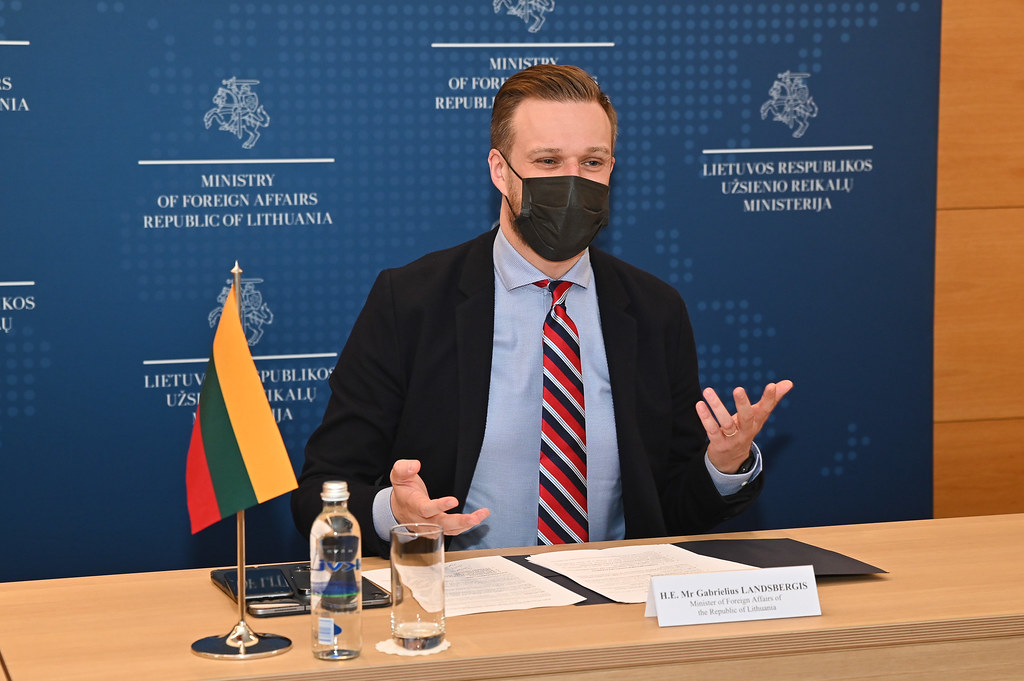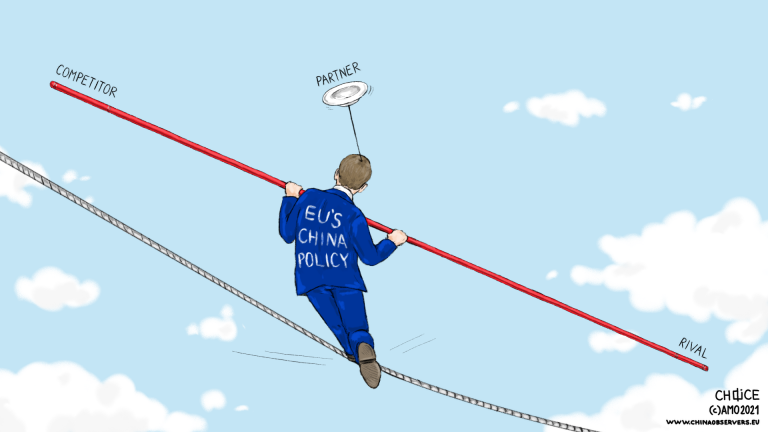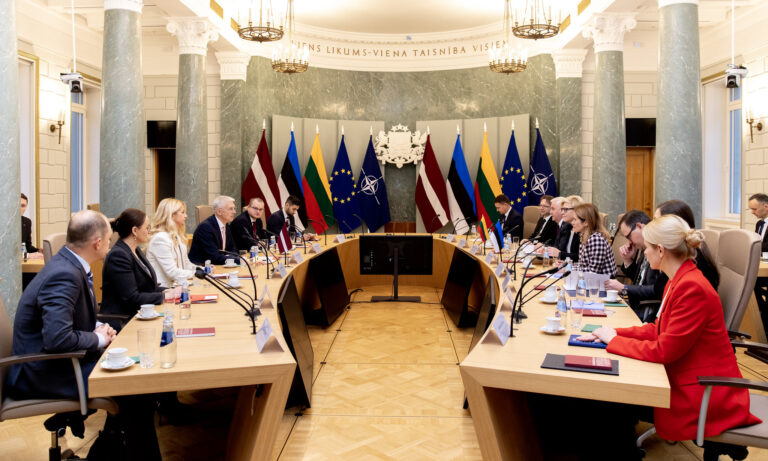
When Lithuanian Ambassador Diana Mickeviciene returned to her posting in Beijing on August 10, she was met with more than just a cold welcome. Having recalled its own envoy from Vilnius, Beijing was now asking Lithuania to reciprocate.
China’s rare move was a reaction to Lithuanian government’s decision to allow Taiwan government to open a representative office in Vilnius under the name of “Taiwan.”
The Turn Toward Taiwan
The latest escalation did not come out of nowhere as Lithuania has been taking steps away from China and moving closer towards deepening relations with Taiwan for some time now. A government coalition agreement included reference to Taiwan, committing to support those fighting for freedom “from Belarus to Taiwan.” While explicit reference to Taiwan did not get into the official program, the new government of Lithuania, which took office in December last year, was quick to launch its new China policy.
In February, the government announced that instead of the highest-level representative as requested by China it would send the minister of transport and communications to the 17+1 meeting. Later in May, Lithuania officially confirmed that it was withdrawing from the format overall and called on other EU countries to follow. The Parliament of Lithuania has also signaled a more critical stance towards China by passing a resolution on the Uyghur situation in China in May.
At the same time, Lithuania has been moving closer towards Taiwan. In March, Vilnius announced its plans to open a trade representative office in Taiwan, echoing the earlier calls by some politicians currently in the governing coalition. This summer it was further confirmed that Taiwan is opening its representative office in Vilnius.
“Taiwan”, Not “Taipei”
On the one hand, Lithuania has been lagging behind in developing its ties with Taiwan as 18 other EU countries have done so years ago. The last time that a representative office was opened by Taiwan in a European capital was in 2003 in Bratislava, Slovakia. On the other hand, this is an extraordinary decision, since the office in Vilnius would be the first in Europe to explicitly refer to Taiwan rather than Taipei – the Taiwanese representative office in Lithuania. And that indeed is the major issue that has angered China.
While China expresses strong objection to the official mentioning of the name of Taiwan and Chinese media considers punishment for Lithuania, the official position of Lithuania is that this does not violate One-China policy. According to a senior official at the Ministry of Foreign Affairs, the decision-makers in Lithuania deemed that the term “Taipei” in the title of the representative office would be misleading as it does not represent the whole territory. Instead “Taiwanese” defines the whole island, which still can be an integral part of China, especially as it is a “Taiwanese” rather than “Taiwan” representative office.
It is difficult to verify at this point what broader reasons behind this choice to deviate from the established practice are, but it is surely a decision that has angered China. Once translated to Chinese, the distinction between the two names disappears(台湾代表处).
Disillusionment With China
While Chinese media has accused Lithuania of being the “running dog” of the USA, having “nearly nothing to do with the island of Taiwan,” Lithuania’s moves have been largely defined by disillusionment with relations with China. First and foremost, a consensus seems to have emerged that a decade of intensive efforts to deepen economic relations with China has not produced significant results, contrary to the high expectations earlier. In 2020, China ranked 22nd as Lithuania’s export destination with exports from Lithuania to Mainland China amounting to €315 million. Foreign direct investment from China in Lithuania also remains limited, ranking 40th with €7.8 million.
Similarly, while China was indicated as a priority inbound tourist market by the Lithuanian tourism department, of nearly 2 million nights spent at tourist accommodation establishments by foreigners in 2019, only 21 thousand were by Chinese tourists. Against this background, there emerged a discussion that Taiwan might actually be a more interesting partner for Lithuanian companies. Now, as the Lithuanian government seeks to open up new opportunities for Lithuania’s exporters, it particularly emphasizes closer relations with other East Asian countries, where full cooperation potential has not been fully utilized yet.
Second, there is disappointment with China’s mode of diplomacy or even a growing threat perception of China in Lithuania. Upon the withdrawal from the 17+1 format, initiated by China, Foreign Minister Gabrielius Landsbergis called the cooperation platform “divisive” suggesting that this is not an acceptable mode of interaction and instead unity of the EU should be maintained. Further, sources within the Lithuanian Ministry of Foreign Affairs also pointed out that the Lithuanian government was pushed away by China’s top-down manner of instructing what they should do or its indirect threats should those demands not be met. Moreover, for the last two years, a National Threat assessment report by the State Security Department referred to China, pointing to its attempts to exert influence and also take over critical infrastructure.
Finally, the foreign policy of Lithuania has long advocated values-based foreign policy, which in this case is both ideological, as well as pragmatic. With the memories of the struggle for its own independence three decades ago still very vivid, Lithuanian foreign policy has strongly advocated democratic values and sought to support democracy in the region. The program of the current government also states the goal of expanding the area of freedom and democracy in the region and beyond and presents Lithuania as “a space of freedom.”
But at the same time, there is a very pragmatic calculus in this thinking, as there is a deep-rooted belief among policymakers that economic cooperation with democratic countries is the most fruitful and that interacting with authoritarian regimes entails significant risks.
Needless to say, this way of thinking is strongly determined by Lithuania’s experience with Russia. For example, natural gas prices have often been manipulated and supplies leveraged as a threat, while sanctions imposed on agricultural imports from Lithuania have also been targeted by Moscow. Likewise, trade relations with China have also been affected by political issues. Thus, aiming to open up new opportunities for Lithuania’s exporters, the government is focusing on “the most advanced democratic world markets,” making Taiwan an attractive option.
In a broader perspective, this foreign policy turn fits neatly with the general foreign policy strategy of the current government. It has expanded its geographic focus and started looking for new economic partners in Asia to promote economic diplomacy. Also, the government has a keen interest in upholding the existing international order, where transatlantic relations are the foundation for the country’s security. The government program‘s section on Lithuania’s defense includes a reference to China’s growing military and political aggression, indicating that China has been included into the equation of Lithuania’s security.
Whatever the reasons behind Lithuania’s move closer to Taiwan, Beijing’s biggest headache is the title of the Taiwanese representative office. As a largely symbolic gesture can quickly become contorted into an existential issue, the potential snowball effect will need to be observed across CEE nations and beyond.
Written by
Vida Macikenaite
VidaMaciVida Macikenaite is an Assistant Professor at the Graduate School of International Relations, International University of Japan. Her research focuses on Chinese foreign policy and international relations in the region surrounding China.


